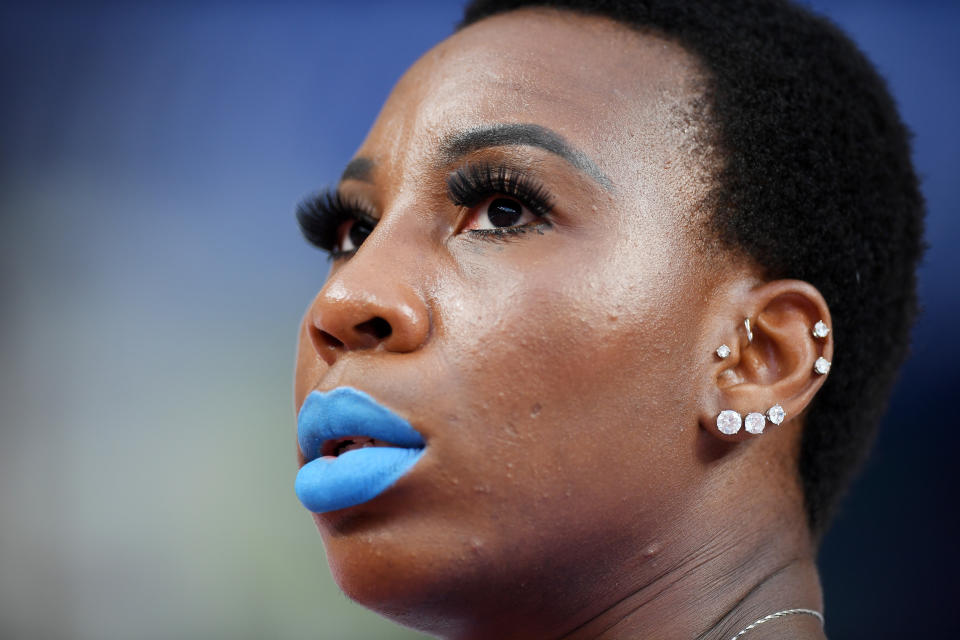Gwen Berry, U.S. Olympian who raised fist, on IOC's protest policy: 'We shouldn't be silenced. It's a form of control'

Gwen Berry found out about the International Olympic Committee’s new protest policy just like the rest of us did.
After raising a closed fist during her medal ceremony at the 2019 Pan American Games, she’d been promised clarity. On Thursday, she got some in the form of a three-page IOC document. The “Rule 50 Guidelines” outlined what would and wouldn’t constitute a forbidden demonstration at the 2020 Olympics.
Among them was what Berry, a 2016 U.S. Olympian in the hammer throw, had done back in August. She won gold. With the Star-Spangled Banner nearing conclusion, she lifted her right arm, bowed her head, and clenched her fist. If she were to repeat the act Tokyo, she would be punished. Her reaction to the new rules?
“It is a form of control,” she told Yahoo Sports over the phone Thursday night. “It’s kind of like silencing us at the biggest moments of our lives. Which ... I really don’t agree with it.”
U.S. hammer thrower Gwen Berry raises her fist at the end of the national anthem at the Pan Am Games today. (h/t @sergeta) pic.twitter.com/gnBCEEDN1m
— Nick Zaccardi (@nzaccardi) August 11, 2019
She understands why the rules are in place. “They want it to just be sports, for the love of sports,” Berry said. But she doesn’t agree with them. And she doesn’t agree with that.
“We sacrifice for something for four years, and we’re at our highest moment,” she said of the Olympics. “We should be able to say whatever we want to say, do whatever we have to do – for our brand, our culture, the people who support us, the countries that support us, [everything].
“We shouldn’t be silenced. It definitely is a form of control.”
Could IOC, USOC, athletes find middle ground?
The IOC reasons that athletes still have opportunities to express themselves adjacent to that “highest moment.” That news conferences and social media offer platforms. But, Berry said, nothing can replicate the true Olympic moment, during or after competition, perhaps on a podium.
When her raised fist drew a formal reprimand from the United States Olympic Committee in August, Berry was told in writing, by CEO Sarah Hirshland, that the USOC “want[ed] to be part of finding more robust opportunities for athletes to use their voices in a meaningful way.” If not in competition, what, exactly, might those opportunities be?
Berry doesn’t know. She wants “more dialogue at the Olympic Games.” In interviews after medals are won, she wants “uncomfortable, real conversations.”
“Because anytime somebody gets on the podium, the first question they ask is, ‘Oh, how does it feel to win a medal for your country?’ ” Berry explained. “It’s the same thing, over and over and over again. Like, when are we gonna have conversations about real issues?’ ”
That the pride of “winning for you country” is almost forced upon athletes is part of the issue. It politicizes the Olympics in the manner in which the IOC wants them to be politicized. The IOC then prohibits athletes from politicizing the Games in any manner in which the athletes might want them to be politicized.
It is, Berry said, “just a form of, ‘Shut up, be an athlete, don’t protest, don’t do anything, just do what you’re supposed to do.’ Hopefully that changes.”
Berry hasn’t been consulted by IOC, USOC
Berry does not know if any acceptable solutions have been discussed. She has had discussions with fellow athletes over the years. But the USOC, she said, has not consulted with her since Hirshland’s letter five months ago. When asked if she expected to have conversations with Olympic officials about possible solutions in the future, she said, “I hope I can. No one has come to me yet.”
Berry acknowledged that the USOC is in a difficult spot when it comes to the subject of protest, in a way bound by whatever the IOC enacts. When asked where she feels the USOC stands, she said, “It’s kinda hard. ... I don’t think they’re on the right or wrong side. I think they’re pretty neutral.”
While she waits for some dialogue, she is in Houston, training, “kinda sore,” preparing for the Olympic Trials and hopefully for Tokyo. She hasn’t thought about how, specifically, she might use the platform if she qualifies. Her raised fist at the Pan Ams, she said, was “spur of the moment,” a culmination of weeks, months, years of feelings about inequality, America, and specifically the treatment of black Americans – about “mass incarceration,” and the killings of unarmed black men, and so much more.
But whether it’s her with the platform or others, her thoughts on sports-adjacent protest and freedom of expression in principle don’t change.
“It has to be done at the Olympic Games,” she said. “Because that is what the athletes sacrifice four years for. It can’t be, ‘Oh, you win a medal, you go home, and then you talk about it.’ It should be talked about [at the Olympics]. Because that’s where it matters the most.”
– – – – – – –
Henry Bushnell is a features writer for Yahoo Sports. Have a tip? Question? Comment? Email him at henrydbushnell@gmail.com, or follow him on Twitter @HenryBushnell, and on Facebook.
More from Yahoo Sports:

